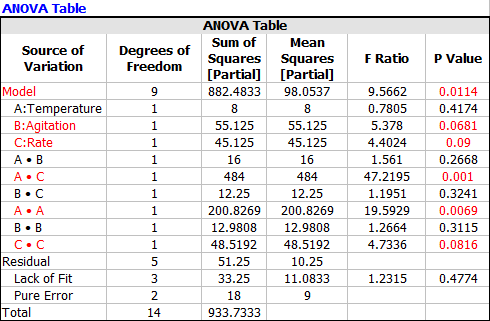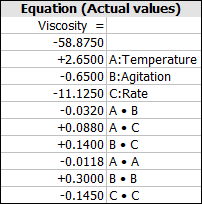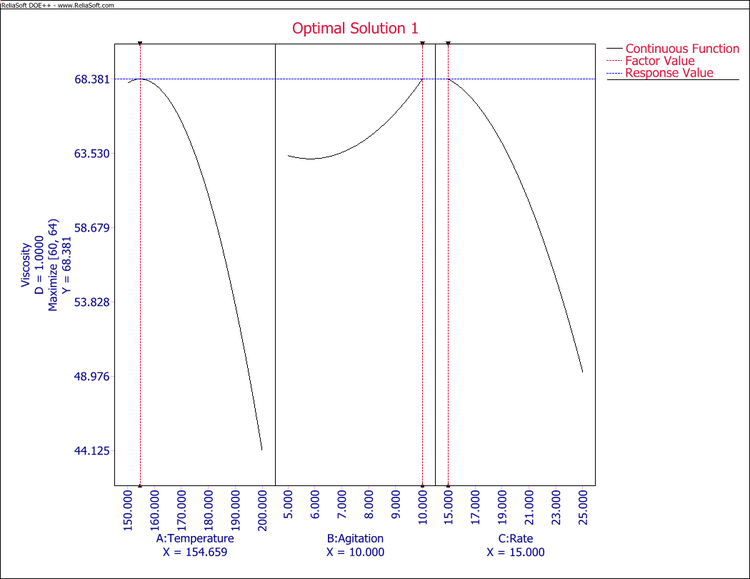New format available! This reference is now available in a new format that offers faster page load, improved display for calculations and images and more targeted search.
As of January 2024, this Reliawiki page will not continue to be updated. Please update all links and bookmarks to the latest references at DOE examples and DOE reference examples.
This example validates the calculation of the Box-Behnken RSM method in DOE++.
Reference Case
Data is from Example 7.5 on page 347 in the book Response Surface Methodology, process and product optimization using design experiments, second edition, by Raymond H. Myers and Douglas C. Montgomery, John Wiley & Sons, Inc. 2002.
Data
| Level (coded value)
|
Temperature (A)
|
Agitation (B)
|
Rate
|
| (C)
|
| High (+1) |
200 |
10 |
25
|
| Center (0) |
175 |
7.5 |
20
|
| Low (-1) |
150 |
5 |
15
|
| Standard order
|
A
|
B
|
C
|
Y
|
| 1 |
-1 |
-1 |
0 |
53
|
| 2 |
+1 |
-1 |
0 |
58
|
| 3 |
-1 |
+1 |
0 |
59
|
| 4 |
+1 |
+1 |
0 |
56
|
| 5 |
-1 |
0 |
-1 |
64
|
| 6 |
+1 |
0 |
-1 |
45
|
| 7 |
-1 |
0 |
+1 |
35
|
| 8 |
+1 |
0 |
+1 |
60
|
| 9 |
0 |
-1 |
-1 |
59
|
| 10 |
0 |
+1 |
-1 |
64
|
| 11 |
0 |
-1 |
+1 |
53
|
| 12 |
0 |
+1 |
+1 |
65
|
| 13 |
0 |
0 |
0 |
65
|
| 14 |
0 |
0 |
0 |
59
|
| 15 |
0 |
0 |
0 |
62
|
The viscosity of the resin was recorded as an indirect measure of molecular weight.
Result
From the book, the ANOVA table (partial sum of squares) is:
| Source
|
Partial SS
|
DF
|
Mean Square
|
F value
|
Prob>F
|
| Model |
882.48 |
9 |
98.05 |
9.57 |
0.0114
|
| A |
8 |
1 |
8.00 |
0.78 |
0.4174
|
| B |
55.12 |
1 |
55.12 |
5.38 |
0.0681
|
| C |
45.13 |
1 |
45.13 |
4.40 |
0.09
|
| 〖 A〗^2 |
200.83 |
1 |
200.83 |
19.59 |
0.0069
|
| B^2 |
12.98 |
1 |
12.98 |
1.27 |
0.3115
|
| C^2 |
48.52 |
1 |
48.52 |
4.73 |
0.0816
|
| AB |
16.00 |
1 |
16.00 |
1.56 |
0.2668
|
| AC |
484.00 |
1 |
484.00 |
47.22 |
0.001
|
| BC |
12.25 |
1 |
12.25 |
1.22 |
0.3241
|
| Residual |
51.25 |
5 |
10.25 |
|
|
| Lack of Fit |
33.25 |
3 |
11.08 |
1.23 |
0.4774
|
| Pure error |
18 |
2 |
9.00 |
|
|
| Cor total |
933.73 |
14 |
|
|
|
The final equation in terms of actual factors:
- [math]\displaystyle{ \begin{align}
Viscosity=-58.875+2.65 * Temp-0.65 * Agitation-11.125*Rate-0.0118*Temp^2+0.3*Agitation^2-0.145*Rate^2-0.032*Temp*Agitation+0.088*Temp*Rate+0.14*Agitation*Rate
\end{align} }[/math]
Results in DOE++
The software results match the book results. The ANOVA table is:
The final equation in terms of actual factors is:
The maximum yield is achieved at 80.21, as shown in the optimization plot. The values at the red dash line are the optimal values for factor A and factor B. The blue line is corresponding to the maximum Y value.



